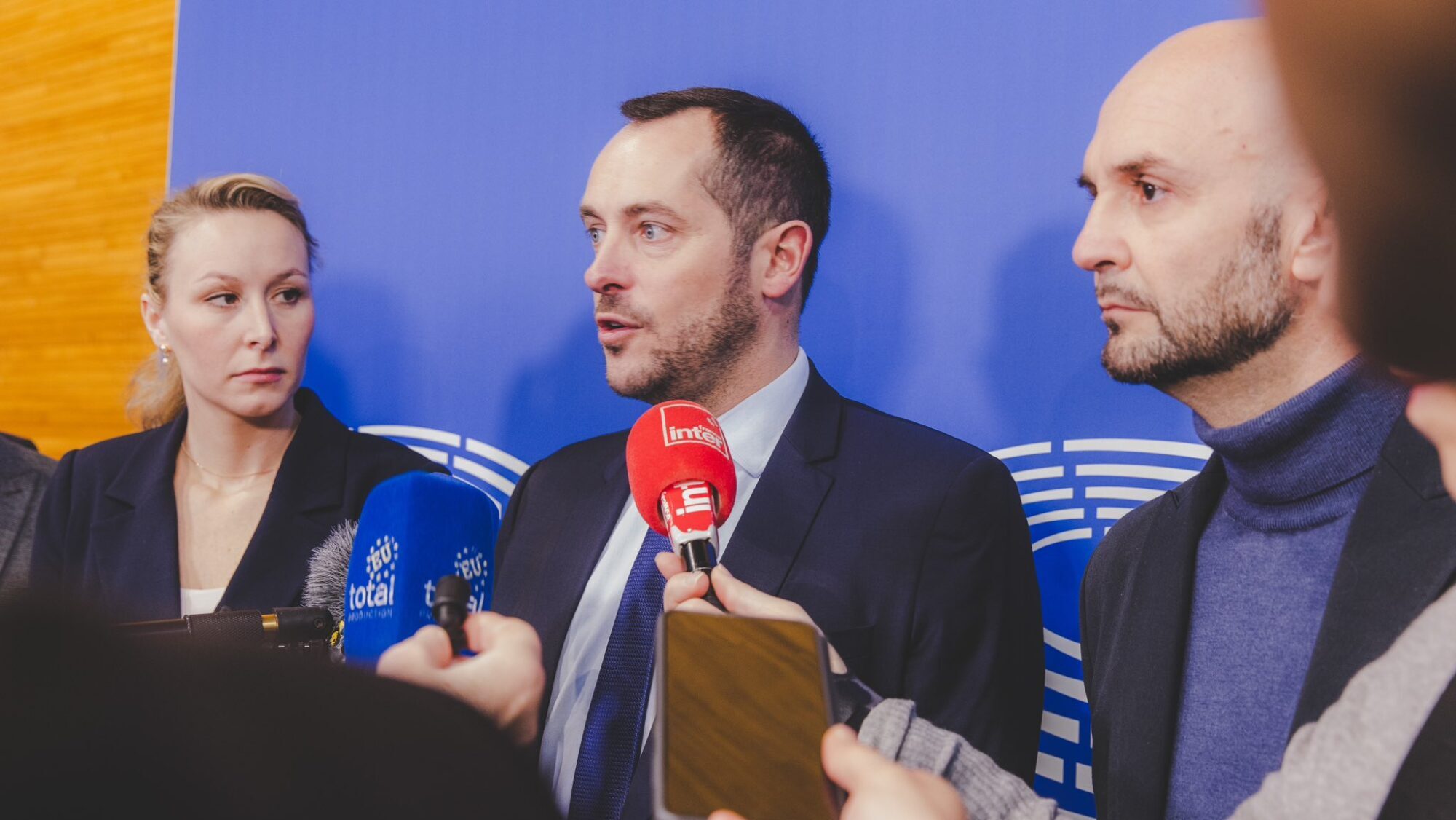
Left to right: Marion Maréchal, Nicolas Bay, and Nicola Procaccini in Strasbourg, announcing that Reconquête has joined ECR.
Photo: @NicolasBay_ on X/Twitter, 7 February 2024
France’s national conservative Reconquête party has joined the European Conservatives and Reformists (ECR) group in the EU parliament, putting them on track to become the parliament’s third largest group after June’s elections.
The move comes just days after Hungary’s governing Fidesz hinted at choosing the ECR over the populist Identity and Democracy (ID) group.
Reconquête is led by Eric Zemmour and is the main rival of Marine Le Pen’s Rassemblement National (RN) on the French populist right.
The ECR announced the arrival of its new member party in Strasbourg on Wednesday, February 7th, in a joint press conference with the party’s co-chairman Nicola Procaccini, Nicolas Bay, Reconquête’s only current MEP, and Marion Maréchal, the party’s lead candidate for the EU elections. As an MEP, Bay had already officially joined the ECR group on Tuesday evening.
🤝🇫🇷 @nicolasbay_ ouvre la voie en intégrant le @ecrgroup que nous rejoindrons avec nos futurs élus dans 4 mois.
— Marion Maréchal (@MarionMarechal) February 7, 2024
C’est un député reconnu et respecté au sein du Parlement où il défend les intérêts des Français, la liberté des nations et notre civilisation depuis 10 ans. pic.twitter.com/twrzzcBX0I
After being asked why they chose the ECR as opposed to the ID, an arguably even more populist group, Maréchal explained that Reconquête was aiming for the bloc that offers more institutional stability and political recognition—and not the one where its rival RN sits.
“ECR will soon include five parties that participate in the governments of their countries, including three that lead them,” Maréchal said. “This means that the Conservatives weigh not only in the European Parliament but also in the Council and even in the Commission. On the other hand, the RN and its ID group are still marginalized within the Parliament and the European bodies.”
While it’s true that ID parties, including the German AfD, the Italian Lega, and Le Pen’s RN do not wield as much power as ECR members domestically, the ID group had been predicted to gain the most new seats until now.
However, with Reconquete’s projected 5 to 6 seats, the 12 to 14 seats of Fidesz, as well as other possible members that Maréchal mentioned, the ECR—home of Meloni’s Fratelli d’Italia, the Polish PiS, the Spanish Vox, and the Sweden Democrats and The Finns, to count a few—could still remain the largest of the two, thus preserving ECR’s position as the main national conservative, sovereigntist force in Brussels.
Nonetheless, Reconquête’s inclusion in ECR still poses a few questions, because, until now, the group was one of the most united in its pro-Ukraine stance, including solid support for wartime financial contributions and the country’s EU accession as well. The French newcomers, however, have a different take on this.
“I am against further enlargement,” Maréchal said, “but let us be clear, you will never find a European group … which is unanimous on everything.” In other areas, such as ending illegal migration and reversing some aspects of the Green Deal, and denouncing “pro-LGBT, woke policies,” Reconquête and the ECR will have no problem working together, and that’s what matters.
Maréchal explained:
ECR is a group that carries the idea of a profound revision of European policy, more respectful of the sovereignty of nations and the defense of their identity. That is the core of our commitment.
Regarding rumors of a possible merger between the ECR and ID—which could make the hypothetical nationalist bloc the largest in Brussels—Maréchal didn’t have anything promising to say. “In reality, from the outset, this large European group was a utopia for one simple reason: most ECR delegations do not want to work with the German AfD or with the Rassemblement National.”
The two groups can and will continue to vote together in most cases, but for many in the ECR it’s “unthinkable” to sit in the same group, she added.
Nonetheless, with both populist blocs facing a major surge after the election, their combined power might even make the establishment center-right EPP abandon its leftist allies for a viable right-wing coalition, at least that’s what Reconquête is hoping for. But for that, it is important that voters realize the so-called “center-right” no longer represents conservatism.
“It is a real shift that can take place,” Maréchal said. “Let us simply say: the choice of … right-wing voters will weigh very heavily in the coming reconfiguration of European politics. It is a unique opportunity to break with this centrist, soft right, Brussels accomplice and Commission support, for a true right, attached to the identity of nations.”
